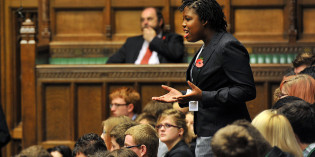Tag: Beyond the Youth Citizenship Commission

David Blunkett: Introducing Citizenship education was the easy bit. We need to do more to encourage schools to support youth participation
The previous Labour government added Citizenship to the National Curriculum in England in 2002. Last week on Democrat Audit David Kerr discussed how its prominence has fallen in more recent and called for more robust monitoring of provision. In this post David Blunkett MP, Education Secretary under Labour, discusses the importance of Citizenship and how its […]

We need renewed political commitment to citizenship education and ongoing monitoring of its provision in schools
Citizenship was added to the National Curriculum in England twelve years ago. As part of our series on youth participation in politics, David Kerr discusses how citizenship has fallen in prominence in recent years as schools have faced other pressures and teaching requirements have been relaxed. He argues for ongoing monitoring of the provision of citizenship education. Similar […]

Electoral turnout for young people peaks immediately after their enfranchisement, then falls sharply
It is established that young people tend to vote less than older generations, particularly in Britain. However, less well understood are the differences in turnout among young people. Based on elections in Finland and Denmark, Yosef Bhatti, Kasper M Hansen, and Hanna Wass have shown that turnout is highest when young people can vote immediately after being […]

The Government needs to implement Youth Citizenship Commission proposals to turn schools into ‘sites of democracy’
As part of our series on youth participation, Andy Mycock and Jonathan Tonge consider the progress made in the five years since the Youth Citizenship Commission made a series of recommendations to government. They find that many of its proposals have been adopted, although without much fanfare. One area where there has been little change is in the […]

Allow young people to set the political agenda by giving youth parliaments the power to call referendums
In the latest post from our series on youth participation, Gerry Stoker challenges the idea that the innocence and political inexperience of young people is a problem we need to solve. Instead, he argues that young people have a less fixed view of politics and are more willing to believe it could be better. He […]

First-time compulsory voting is designed to get politicians to engage with young voters’ concerns
This week on Democratic Audit, Matt Henn and Nick Foard argued that introducing compulsory voting would risk increasing the resentment of young people toward politics. In this post we feature a response from Glenn Gottfried and Sarah Birch, who have proposed compulsory voting for first-time voters. They argue this could be an effective tool to […]

Compulsory voting may reinforce the resentment young people feel toward the political class
With young people much less likely to vote than older generations, it has been proposed the UK follow other countries such as Belgium and Australia by introducing compulsory voting, with IPPR suggesting only first-time voters should be forced to participate. Matt Henn and Nick Foard consider the merits of this proposal using data from a […]

16 and 17 year olds are not fully autonomous, and therefore should not be allowed to vote
The Scottish Government has allowed 16 and 17 year olds to participate in the forthcoming referendum on independence. Here, Dan Degerman argues that this age group, though in some ways in possession of the necessary faculties and experiences required to participate in the electoral process, lack the right to vote due to their restricted options in other spheres of […]

Votes at 16 should be part of the systemic reform needed to counter youth abstention from democratic institutions
Andrew Mycock and Jonathan Tonge argued on Democratic Audit recently that lowering the voting age to 16 in the UK should not be considered while much wider and political reform is required to engage young people. In this post Benjamin Bowman responds, suggesting that enfranchising should be part of this systemic reform, and would place the right […]

The case for lowering the voting age is less persuasive now than at any point in the last 50 years
The debate on lowering the voting age has intensified in recent months, including in Parliament, as Democratic Audit posts this week by MPs Sarah Champion and Mark Harper have shown. In this post, Andrew Russell examines one of the arguments made by campaigners, that the voting age should be lowered to bring it in line with other […]


 Democratic Audit's core funding is provided by the Joseph Rowntree Charitable Trust. Additional funding is provided by the London School of Economics.
Democratic Audit's core funding is provided by the Joseph Rowntree Charitable Trust. Additional funding is provided by the London School of Economics.